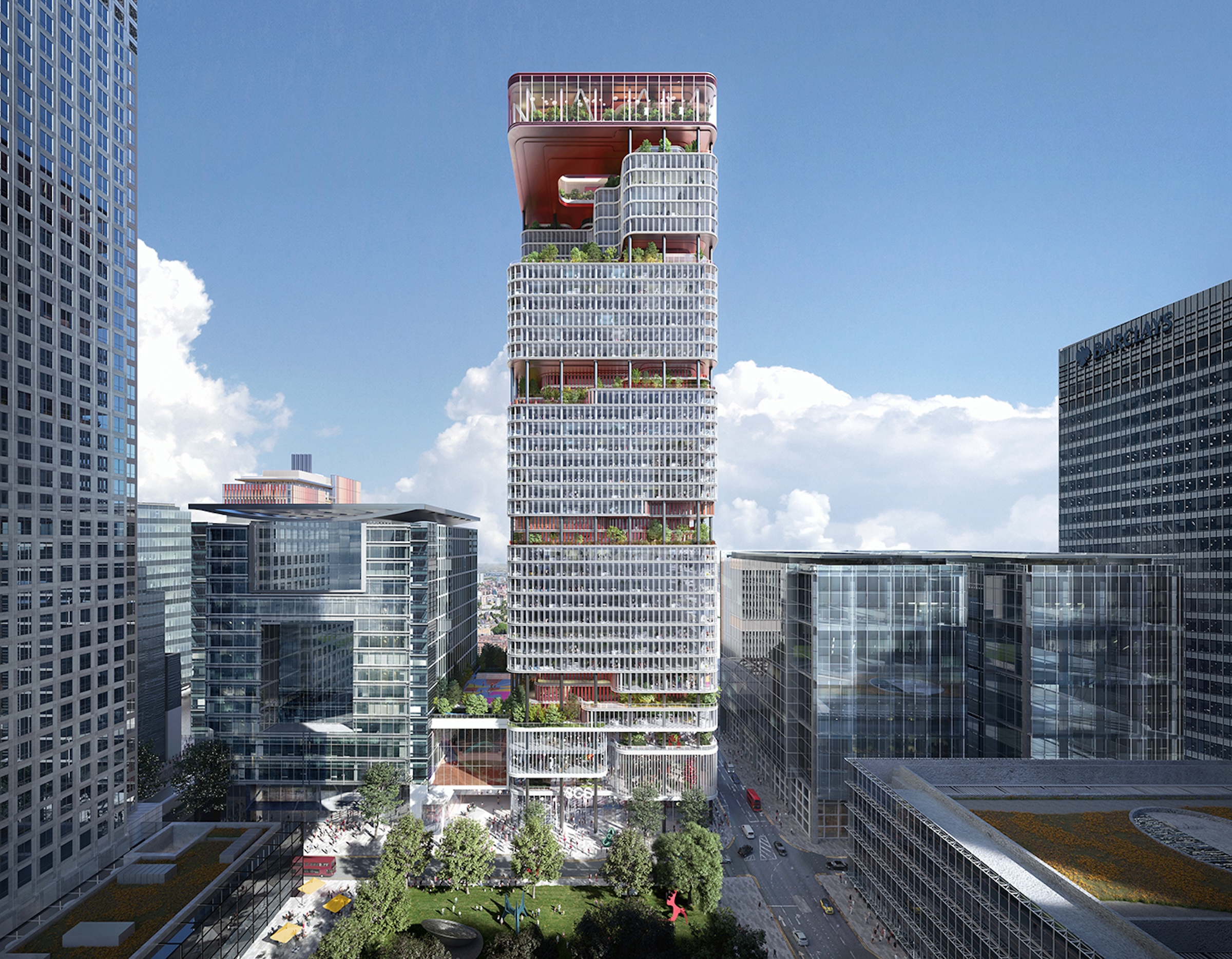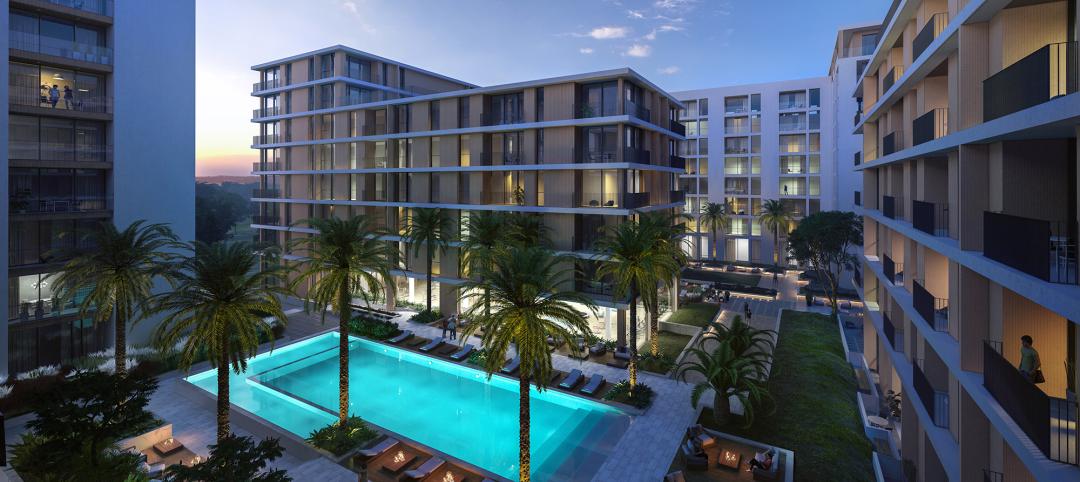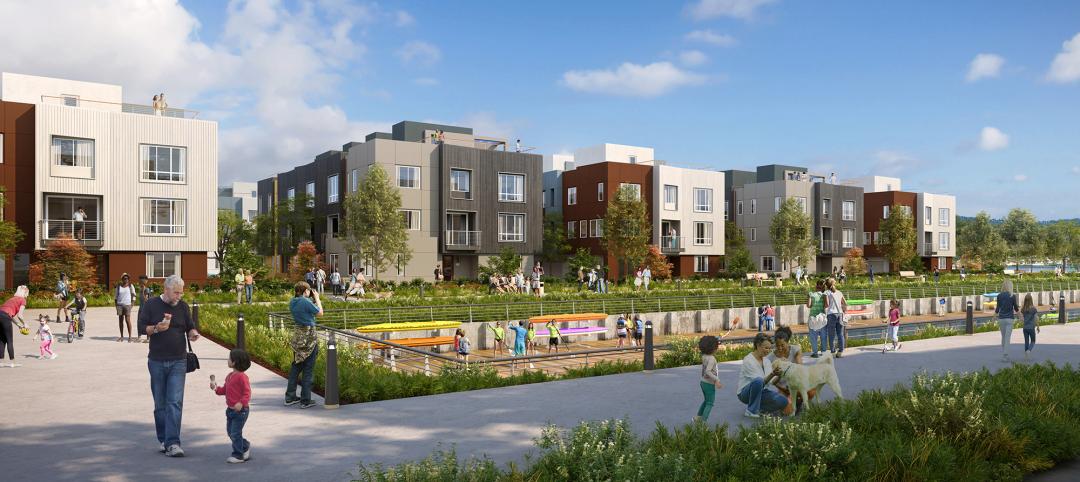8 Canada Square, a Norman Foster-designed office building that’s currently the global headquarters of HSBC Holdings, will have large sections of its façade removed to create landscaped terraces.
The project will be the world’s largest transformation of an office tower into a sustainable mixed-use building, according to a press statement from Qatar Investment Authority (QIA), which owns 8 Canada Square, and development partner Canary Wharf Group (CWG). The project is expected to start in 2027, after the current HSBC lease expires, and be completed in 2030.
QIA and CWG recently released the architectural plans for the redevelopment of 8 Canada Square, which is located in Canary Wharf, a London business district. In 2023, Canary Wharf saw an all-time high of 67.2 million visitors, according to the statement.
The design by Kohn Pedersen Fox (KPF), which won QIA and CWG’s global competition, reimagines the office tower as a mixed-use building. The project will create multiple green terraces and breakout spaces to provide access to daylight, views, social spaces, and fresh air. The 1.1 million sf, 42-story building will feature workspaces, leisure, entertainment, education, and cultural attractions.
The project will create a new publicly accessible route between the adjacent Elizabeth line station and Canada Square Park, while also offering views across London from Canary Wharf to the public for the first time.
The design concept plans to retain as much of the building’s existing material as possible to preserve embodied carbon and reduce whole life carbon. In collaboration with a range of consultants, the team intends to retain up to 70% of the original façade framing and up to 75% of the structure.
“This redevelopment is another step in Canary Wharf’s evolution into a vibrant mixed-use neighborhood offering workspace, retail, homes, leisure and amenities all in one location—a true 15-minute city,” Shobi Khan, CWG CEO, said in the statement.
KPF is working with the London Borough of Tower Hamlets, QIA, CWG, and the wider design team to develop plans and submit a planning application.
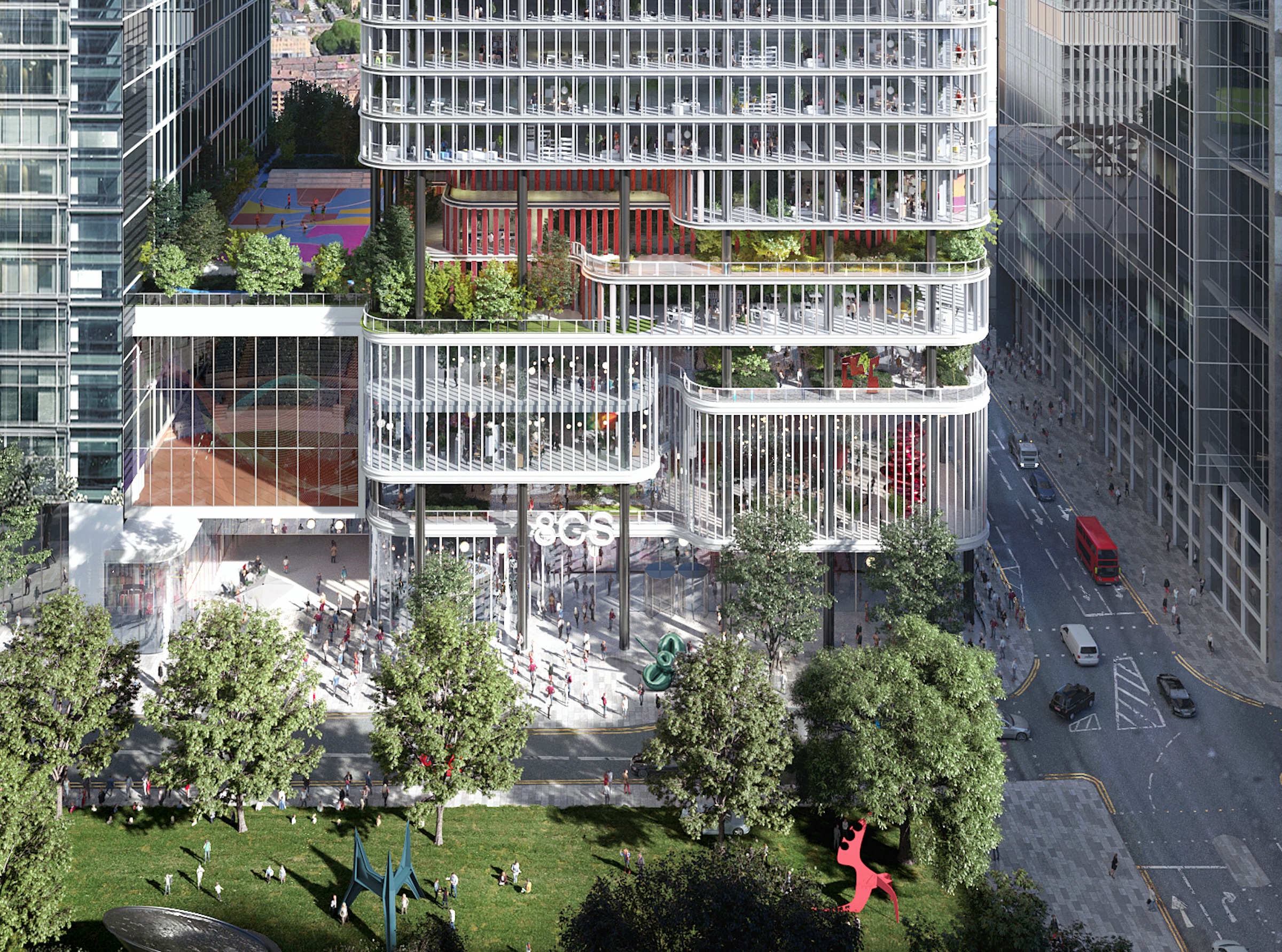
Here is the full press release from Canary Wharf Group:
Qatar Investment Authority (QIA) and Canary Wharf Group (CWG) have today released the first images of architectural plans that display the ambition for the redevelopment of the iconic 8 Canada Square building in Canary Wharf. 8 Canada Square is fully owned by QIA, and CWG is the development partner.
Kohn Pedersen Fox (KPF), the world-renowned architectural practice won a global competition run by QIA and CWG to reimagine the building. KPF will work with a market-leading team across design, engineering, planning and delivery on one of the world’s largest redevelopment projects. The project is set to begin in 2027, following the expiry of the current HSBC lease.
The images of the 1.1 million sq ft building demonstrate the transformation into a unique destination, which will include best-in-class workspaces, leisure, entertainment, education, and cultural attractions. The redevelopment will create a unique proposition for businesses within 8 Canada Square, with unparalleled sustainability credentials, excellent transport links and amenities. Set in the heart of Canary Wharf, the plans will enable a new publicly accessible route between the adjacent Elizabeth line station and Canada Square Park as well as offering the outstanding views across London from Canary Wharf to the public for the first time.
The investment from QIA to transform 8 Canada Square is a flagship example of the sovereign fund’s vision for multi-use real estate of the future, ensuring that the iconic building has world-class ESG credentials and meets the changing requirements of business for the long term.

The building’s changing shape will create a unique proposition for businesses within 8 Canada Square, with users also benefitting from being in Canary Wharf, where visitor numbers are at an all-time high with 67.2 million people visiting Canary Wharf during 2023.
Shobi Khan, CEO of CWG, added, “We look forward to working with QIA on 8 Canada Square to deliver a building of outstanding design, engineering and sustainability standards. This redevelopment is another step in Canary Wharf’s evolution into a vibrant mixed-use neighbourhood offering workspace, retail, homes, leisure and amenities all in one location – a true 15-minute city.”
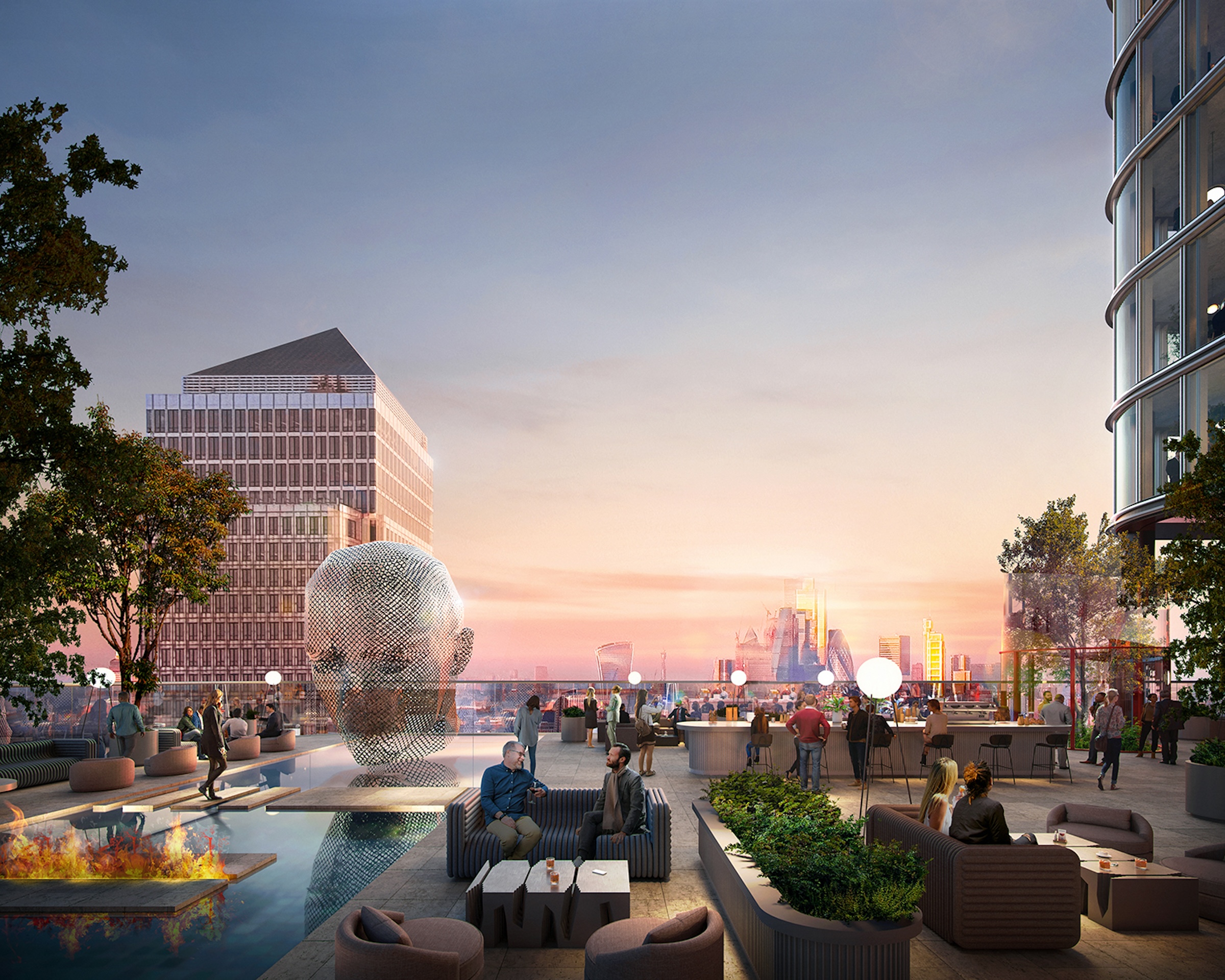
Elie Gamburg, Design Principal at Kohn Pedersen Fox (KPF), said: “We are extremely excited to collaborate with QIA and CWG to reimagine the single-use office building as a blueprint for the highly sustainable, mixed-use building of the future. This transformation embodies the ethos behind much of our work, we see it as an integral part of the evolution of today’s single-use neighbourhoods into vibrant mixed-use neighborhoods of tomorrow – an evolution of which CWG is already leading the way.”
CWG and QIA will be working with the London Borough of Tower Hamlets and the appointed team to develop plans and submit a planning application.
Related Stories
Adaptive Reuse | May 9, 2024
Hotels now account for over one-third of adaptive reuse projects
For the first time ever, hotel to apartment conversion projects have overtaken office-to-residential conversions.
MFPRO+ Special Reports | May 6, 2024
Top 10 trends in affordable housing
Among affordable housing developers today, there’s one commonality tying projects together: uncertainty. AEC firms share their latest insights and philosophies on the future of affordable housing in BD+C's 2023 Multifamily Annual Report.
Retail Centers | May 3, 2024
Outside Las Vegas, two unused office buildings will be turned into an open-air retail development
In Henderson, Nev., a city roughly 15 miles southeast of Las Vegas, 100,000 sf of unused office space will be turned into an open-air retail development called The Cliff. The $30 million adaptive reuse development will convert the site’s two office buildings into a destination for retail stores, chef-driven restaurants, and community entertainment.
Adaptive Reuse | Apr 29, 2024
6 characteristics of a successful adaptive reuse conversion
In the continuous battle against housing shortages and the surplus of vacant buildings, developers are turning their attention to the viability of adaptive reuse for their properties.
Mixed-Use | Apr 13, 2024
Former industrial marina gets adaptive reuse treatment
At its core, adaptive reuse is an active reimagining of the built environment in ways that serve the communities who use it. Successful adaptive reuse uncovers the latent potential in a place and uses it to meet people’s present needs.
Mixed-Use | Apr 9, 2024
A surging master-planned community in Utah gets its own entertainment district
Since its construction began two decades ago, Daybreak, the 4,100-acre master-planned community in South Jordan, Utah, has been a catalyst and model for regional growth. The latest addition is a 200-acre mixed-use entertainment district that will serve as a walkable and bikeable neighborhood within the community, anchored by a minor-league baseball park and a cinema/entertainment complex.
Adaptive Reuse | Apr 5, 2024
McHugh Construction completes restoration of Chicago’s historic Ramova Theatre
Adaptive reuse project turns 1929 cinema into a live performance venue, adds a brewery and a taproom, and revives the Ramova Grill in Chicago’s Bridgeport neighborhood.
Adaptive Reuse | Mar 30, 2024
Hotel vs. office: Different challenges in commercial to residential conversions
In the midst of a national housing shortage, developers are examining the viability of commercial to residential conversions as a solution to both problems.
Cultural Facilities | Mar 26, 2024
Renovation restores century-old Brooklyn Paramount Theater to its original use
The renovation of the iconic Brooklyn Paramount Theater restored the building to its original purpose as a movie theater and music performance venue. Long Island University had acquired the venue in the 1960s and repurposed it as the school’s basketball court.
Adaptive Reuse | Mar 26, 2024
Adaptive Reuse Scorecard released to help developers assess project viability
Lamar Johnson Collaborative announced the debut of the firm’s Adaptive Reuse Scorecard, a proprietary methodology to quickly analyze the viability of converting buildings to other uses.


